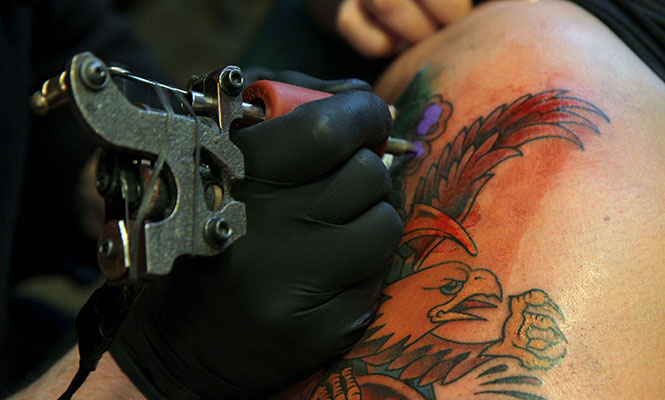Kent City Council raises fee for tattoo parlors
Tattoo artist Larry Spano, 32, of Kent works on a piece for Amanda Burkhart, 21, of Streetsboro, inside Defiance Tattoos in downtown Kent on Saturday, April 6, 2013. Spano has been working at the Kent shop for almost four years.
February 6, 2014
Kent City Council unanimously passed a city ordinance at January’s meeting that increases the annual inspection fee for tattoo parlors from $100 to $300.
Jack Kuhar, Ward 2 council member and chair of the Health and Public Safety Committee, said the $300 fee went into effect immediately after January’s city council meeting, and tattoo parlors will pay the increased fee during the annual inspections needed to renew their licenses.
Health Commissioner Jeff Neistadt said the inspection fee, unchanged since 1995, did not meet the needs of the inspection program because the health department completes two inspections annually. The $300 fee and a $150 plan-review fee for new facilities will ensure the inspection program will not need to use the city’s general fund.
“If the health department needs more money to do their job, I’m fine with that, as long as it doesn’t become exponential,” said Jay Miller, owner and artist at Crucible Tattoo. “I don’t want them to decide every couple years that they need more money.”
In comparison, the health department also licenses restaurants, barber shops, boarding houses and swimming pools. Neistadt said food service operations pay from $200 to $500 annually depending on their classification. The city council has also increased the inspection fees for restaurants and swimming pools over the last two years.
Miller said he does not see the increase of the annual fee effect in his parlor’s prices or business. Instead, Miller sees illegal tattoo artists as a bigger threat.
“Without inspections, without the health department being involved, it’s too difficult to say that everybody is on the same playing field,” Miller said.“I think the health department being more involved and doing more inspections helps keep everyone in check. I think that’s all we really want.”
Deathstar Nation owner Brian Carnes echoed Miller’s sentiments.
“If the city of Kent were to raise that price to $1,000, I would be totally happy with it,” Carnes said. “That will separate the people who only have half their hearts in this industry. You have so many people in this area tattooing who shouldn’t be.”
Miller said a cap on the fee would be appropriate and provide security that the fee would not reach $1,000 five years from now. He said he understands the health department has more tattoo parlors to inspect but hopes his $300 fee can cause some change.
“I want them to enforce the people who are tattooing illegally out of their homes and garages,” Miller said. “It costs me thousands of dollars to have this shop and do it legally, and, to me, people tattooing illegally is more of a detriment to my business than paying a little more for a license.”
Carnes said he also hopes the increase of the fee will allow the health department to have room in the budget to do more leg work and shut down the illegal tattoo artists.
Contact Tyler Singleton at [email protected].












